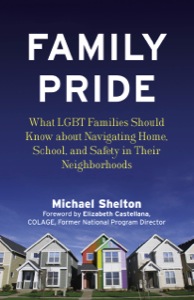
At your house, the door’s always open.
You love having a big group around your table any time; in fact, the more, the merrier. Family and friends never hesitate to stop by because you’ll make room for them no matter what. They’re always welcome. They know that.
The door’s always open, but it’s also closed.
You’re an LGBT family, and that creates some sticky issues. Whom do you tell and what’s safe to say? How do you protect your children? You may get a little guidance on that by reading Family Pride by Michael Shelton.
Your family is just like everybody else’s. Almost.
You like the same foods and TV programs, wear the same clothes, drive the same streets and laugh at the same stupid things. The only difference between you and the other families in your neighborhood is that you’re gay. You’re also in good company: a third of lesbians and one out of five gay men are parents.
Still, almost half of your neighbors think they have nothing in common with you.
Pop culture, don’t-tell behavior and mythology are partly to blame for that: it’s widely (and erroneously) believed, for example, that most LGBT households are affluent, white, highly-educated and only found in urban areas. Lesbian single mothers often keep their lives hidden to protect their children. Rural and small-town LGBT families are thought not to exist.
The general truth is that what researchers know about same-sex parents is “not necessarily accurate.” This is exacerbated by what Shelton says is “passing,” or telling a white lie or a lie of omission in order to maintain discretion within the community. “Passing,” therefore, avoids full disclosure, which may be undesirable for reasons of discrimination, bullying or downright danger.
There are, of course, impacts on the children for “passing,” just like there are for coming out (which, says Shelton, should be a “process”). Children in an LGBT family can’t be raised like every other kid because they’re not like other kids. Still, they should know the truth about their parents; they can be taught the fine art of discretion without lying and they should be taught that straight people are not the enemy.
I struggled a lot with what’s inside Family Pride.
I liked that LGBT parents will find a lot of information in this book: information on diversity, studies, challenges and services that can help to meet those challenges. Author Michael Shelton includes case studies and first-person accounts to support his facts, and they’re quite interesting to read.
I fear, however, that what you’ll find may be old news. Anyone living as a gay man or a lesbian is likely already aware of laws, services and harassment. They know how and where to seek help. They don’t need a book to tell them the statistics.
Therefore, overall, I think that the audience for this book lies in newly-created LGBT families or allies wishing to understand or lend a hand. Family Pride will be helpful for them, but established LGBT families probably needn’t bother to open it.
BOOK REVIEW
Family Pride: What LGBT Families Should Know about Navigating Home, School and Safety in Their Neighborhoods by Michael Shelton
© 2012, Beacon Press
$16.00 / $19.00 Canada
240 pages











